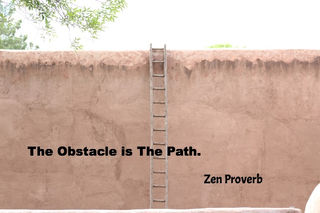Motivation
Overcoming Obstacles
Whatever your goal, there will be obstacles in your way. How do you react?
Posted May 12, 2016 Reviewed by Davia Sills

You set goals and have dreams you want to fulfill. You are excited about life and what you want your life to be. You start the work to make your dreams a reality. Then you run into roadblocks.
Maybe you want a relationship, but no one responds to your profile on the dating site. Maybe you want to move to a place you love, but you can't find a way to pay for the move. Maybe you want a steady paycheck, and you can't keep a job. Whatever your goal is, there are obstacles in the way.
Your Perception of Obstacles Makes a Difference
Some people see obstacles as a puzzle to solve. Some see obstacles as an opportunity to grow. Others see obstacles as threats. Still others see obstacles as meaning they cannot succeed. Your view of barriers to achieving your goals affects how you react.
If you see obstacles as the world being against you or as meaning you failed, then you are likely to be overwhelmed with painful thoughts and difficult emotions when faced with blocks to your goals.
Perhaps you don't really experience thoughts when faced with an obstacle. Maybe you immediately experience fear or shame. Fear tells you to escape the situation, that you are in danger. Shame urges you to hide. If the situation isn't one in which you need to be afraid or ashamed, these emotions get in the way of your overcoming obstacles. (Other emotions that you might experience also urge you to take certain actions that might or might not be helpful. To understand more about your emotions and the actions associated with the emotions, try this fabulous atlas of emotions.)
Either your thoughts or your emotions or both can lead you to stop working on your goals. You lose your passion. Perhaps you become resigned and no longer think about your goals or what's important to you. Your reactions to obstacles stopped you from trying.
Think about the last obstacle you faced. What thoughts did you have? What emotions did you have?
Were your reactions to the last obstacle you faced accurate? Were they helpful? What is your pattern of responding to obstacles?

Discouragement, anger, sadness are all emotions that you might experience when faced with an obstacle. These emotions could dissuade you from attempting to overcome the obstacle.
Maybe you blame yourself or others that your path to your goal is blocked. Those thoughts could persuade you to stop pursuing your goal.
The truth is that achieving most goals means overcoming obstacles. That's normal and part of the process. There's a quote from Frank Clark, "If you find a path with no obstacles, it probably doesn't lead anywhere."
Sometimes obstacles can be overcome, and sometimes they can't. Sometimes you have to work around them or find alternatives. The key is to not give up without wise consideration because you hit an obstacle, or because of your emotional reaction to the obstacle.
Skills for the Wise Consideration of Obstacles
1. STOP. This is a good time to use the STOP skill from Dialectical Behavior Therapy. STOP stands for Stop, Take a step back, Observe, and Proceed mindfully.
Take a step back and observe your emotions. Let your emotions calm. Then observe the obstacle as you would if it were someone else facing it. What would you tell someone else to do?
2. Practice radical acceptance. Whatever goal you want to achieve will include overcoming obstacles. Expect obstacles and accept them as part of achieving the goal. Of course, you don't want that. No one does. And most often the truth is there will be obstacles.
3. Accept your emotions. When you encounter an obstacle, you'll experience emotions. Of course, you will! That's normal. Take a break and spend some time soothing yourself. The idea is to not let your emotions stop you from doing what you can. Get into "wise mind," which is able to think clearly to consider the emotional costs of pursuing a goal (Is it worth it?) and the facts of the situation.
4. Use your "wise mind." Make decisions about obstacles with your wise mind: Your emotion mind will urge you to quit, act impulsively, rage, or give up when faced with obstacles to your goal. Wait for your wise mind to be in charge. Your wise mind can take in new information, be flexible in considering alternatives, and be creative in thinking of solutions.
5. Be willing to consider different ways to reach your goal. In Radically Open DBT, Lynch refers to being in "flexible mind." A flexible mind is open to new ideas and new solutions. Knowing what doesn't work to get you to your goal allows you to think of alternatives that might work. Learning that the path you originally chose doesn't work is disappointing, but at least you know what doesn't work. That's important information.
Maybe you wanted to be a teacher, but you can't find the money to go to school. What would be an alternative? Think on what it is about teaching that you love. If you love helping children, then think of other ways to do that. Maybe being an assistant teacher or working with children in a daycare. Maybe you could teach a skill that you have, such as playing the piano or swimming.
Use your creativity. What else might be an alternative?
You could also work on ways to find the money to go to school. You could consider taking even one class at a time.
6. Find meaning. When we experience difficult situations, it's certainly uncomfortable, to say the least. At the same time, you can often find meaning in the obstacles you face. Ask yourself: What lesson can I learn from this? Does this add to my life or my understanding in any way?
I'm a cancer survivor. From having cancer, I realized that when you first learn about something scary or unwanted in your life is the worst time, perhaps second only to uncertainty. When you first learn about an obstacle, it may seem more overwhelming than it will after you have thought about it.
Once you know and accept that a problem exists, then you can work on solving the problem or on radically accepting the situation. The overwhelming feelings go down. Lack of acceptance keeps you from working on the solution or on accepting what you can't change. Look for what you can learn from the obstacles you face or have faced.
7. Be willing to ask for input. Asking for ideas from others is an interpersonal skill. Getting information from other people can be very helpful in overcoming obstacles. Other people are likely to know resources that you don't, and they will have ideas that you may not have thought of. They also see the world differently than you do and may see solutions you don't. Ask more than one person.
8. Set small goals that lead to the overall goal. Obstacles can be complex and difficult. Achieving goals can be challenging and overwhelming with all that you need to do. It's hard to keep motivation high over time. Break down what you need to do to overcome the obstacle into small steps. Focus on one step at a time. For example, if you want to learn to make more friends, then small goals could start with spending more time around people.
9. Mistakes are normal. As surely as the sun rises every morning, you'll make mistakes as you work toward your goal. It's just part of being human. If you find yourself judging others or yourself, or blaming others or yourself, just notice those thoughts and let them go. Remember nonjudgmental thinking. Acknowledge the mistake is there, and look at what you need to do next. Blaming discourages you, wastes your energy, and isn't helpful in solving the problem. Don't let making mistakes stop you.
10. Reevaluate. Sometimes what you think you want turns out to not be right for you. It's normal to work toward a goal and then change your plans along the way. Part of working toward a goal is getting more information and learning more about what you are working toward.
You might decide you want to run five days a week. As you work toward the goal, you learn that you actually prefer to do different activities and that you are bored by running every day. You change your goal to doing something physically active or to taking dancing lessons instead.
11. Celebrate! Recognizing your accomplishments is so very important. Celebrate the small steps you take. This helps you to stay motivated and to realize that you can do things. It helps you focus on what you do accomplish, not just on the obstacles or what doesn't work out.
If an obstacle can't be overcome, and you can't find an alternative to your goal, then celebrate that you put the effort in and did your best. Use your flexible, wise mind and think of another goal that you want to pursue.
Think about these steps. Which ones do you do well, and which ones could you add to your style of overcoming obstacles?




